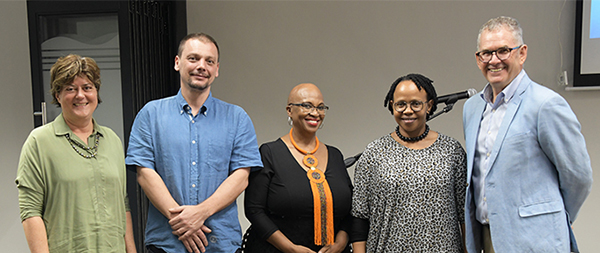News & Media
The significance of post-digital theory in education examined
Unisa is expanding internationalisation by using an opportunity provided by the European Union (EU) through its Erasmus+ programme, an initiative aimed at supporting education and training with a strong focus on social inclusion and digital transition, among others. One of the programme’s key features is mobility (exchange), where academics, students or staff coming from international institutions that partnered with Erasmus+ expand into different higher learning institutions to share knowledge and other facets as set out in the Digital Education Action Plan and the European Skills Agenda of the EU. Unisan Prof Paul Prinsloo and visiting Prof Jandrić are the recipients of the Erasmus+ mobility grant.

From left: Prof Katherine Malan, Department of Decision Sciences, College of Economic and Management Sciences; Prof Petar Jandrić, Zagreb University of Applied Sciences, Croatia; Prof Mpine Makoe, Acting Executive Dean of the College of Education; Prof Thenjiwe Meyiwa, Vice-Principal of Research, Postgraduate Studies, Innovation and Commercialisation; and Prof Paul Prinsloo, Researcher in Open and Distance Learning, College of Economic and Management Sciences
Unisa’s Internationalisation and Partnerships Division facilitated this exchange, which will see Prof Paul Prinsloo on a scholarly visit to the Zagreb University of Applied Sciences in June 2023, as part of Unisa’s drive to advance international scholarly engagements in teaching and learning.
The notion of the post-digital holds specific relevance to Unisa as a comprehensive open, distance and eLearning (CODeL) institution with as vision to be the African university in the service of humanity. As Unisa celebrates its 150th year of existence this year, the visit of Jandrić is of specific relevance as the university continues to expand globally in the digital space in terms of teaching and learning.
Jandrić is a Professor at the University of Applied Sciences in Zagreb (Croatia), Visiting Professor at the University of Wolverhampton (UK), and Visiting Associate Professor at the University of Zagreb (Croatia). His previous academic affiliations include Croatian Academic and Research Network and the National e-Science Centre at the University of Edinburgh, among others. He is also the editor-in-chief of the journal Postdigital Science and Education. His current projects are focused om collaborative research and editing.
Our lives Intertwined with technology
In her welcome address, Prof Thenjiwe Meyiwa, Unisa’s Vice Principal of Research, Postgraduate Studies, Innovation and Commercialisation, mentioned a project commissioned by the Unisa Chancellor, His Excellency Dr Thabo Mbeki, to digitise the Presidential Library consisting of material spanning around five kilometres – and that of other presidents in the continent – as part of Unisa’s acclaimed innovative response to post-digitisation.
Meyiwa also acknowledged the post-digital sphere through emphasising that technology is ubiquitous – that both the physical and the digital world are intertwined. She also observed the diversity in digital experiences towards enhancing ethical implications in society, and the need for digital engagement with digital technology.
Meyiwa lauded the collaboration brought by the Erasmus+ exchange programme, in bringing Jandrić to Unisa.
Traversing the post-digital era
In his address, Jandrić highlighted the significance of technology usage in the 21st century to advance post-digital science and education. He paraphrased Nicholas Negroponte, co-founder of MIT Media Lab, who said that the digital has now become like the air we breathe, and the water in which fish swim, our offline and online lives have become much the same – inseparable. "This," said Jandrić, "further, prompted Negroponte to state that the 'the digital is noticed only by its absence, not its presence'."
"The continued use of notions of 'offline' and 'online' is increasing becoming untenable as our personal and professional lives have become unthinkable with being online," continued Jandrić.
Jandrić said that we currently live in a post-digital world, and that our challenges are therefore also post-digital. He continued: "You do not notice electricity until it is gone. In other words, take power blackouts (load-shedding), and the idea that you can prepare for them by charging your phone and other essential devises. So, the idea is that technology always has an impact on the human, and the other way around – the two are inseparable, and that is the significance of post-digital theory in education."
He said since the year 2000 many people have begun using the word post-digital, predominantly in the arts, humanities and social sciences domains. He said In 2018, he and his colleagues founded the journal Postdigital Science and Educationl, after being frustrated with terms such as e-learning or online learning, which he said are driven by technological determinism – that technology defines the way we should live, rather than the other way around. "So, 'post-digital' provided a framework for the type of research and practise that we engaged in," he stated.
The concept, he said, is relatively new and many scholars disagree on its definition. Acknowledging this, he said: "We cannot fall asleep digital, and wake up post-digital. It is a process."
Jandrić concluded that with the post-digital era comes new opportunities and challenges, such as algorithmic, data and technoscientific capitalism, and bio-informational capitalism, which evoke necessary scholarly attention.
#Unisa150
* By Godfrey Madibane, Acting Journalist, Department of Institutional Advancement
* Photo by Given Maluleka, Unisa Multimedia Centre
Publish date: 2023/02/20

 Unisa co-hosts G20 community outreach in the Eastern Cape
Unisa co-hosts G20 community outreach in the Eastern Cape
 Unisans gain membership of prestigious science academies
Unisans gain membership of prestigious science academies
 Advocating for disability transformation through servant leadership
Advocating for disability transformation through servant leadership
 Unisa Press continues to illuminate the publishing space
Unisa Press continues to illuminate the publishing space